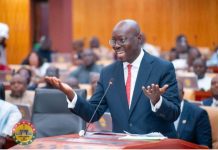The government of Ghana is now a heavy burden on the citizens considering the dire crisis the citizens find themselves in. Weak governance and corruption coupled with impurity and gross disrespect for law and order have undermined every poverty alleviation effort attempted in Ghana.
There is inflexible accountability, mismanagement of resources, and lack of transparency which has hampered the effective implementation of every poverty alleviation policy and program ever introduced in the country.
Ghana is faced with an unprecedented debt crisis, high inflation, and the devaluation of the local currency the Cedi. This phenomenon limits to a very large extent, the government’s room for ploys.
In December 2022, Ghana agreed with the International Monetary Fund (IMF), which is supposed to lead to a support program; however, on May 17th, 2023, the IMF’s Executive Board approved an SDR 2.242 billion (about US$3 billion) 36-month Extended Credit Facility (ECF) arrangement for Ghana and so Ghana will for the 17th time, be under an IMF program for the next three years.
This decision enabled an immediate disbursement equivalent of SDR 451.4 million (about US$600 million) and I can quite remember what the Minister of Finance, Mr. Ofori-Atta said during the E-levy engagements ” We are not going to IMF for bailout” captured by Joy Business News on Tuesday, November 09, 2021.
Nonetheless, the recent macroeconomic and financial developments depict some fiscal deficit widened slightly, to 9.3% of GDP from 9.2% in 2021 due to higher spending. Public debt hit 93.5% of GDP in 2022, up from 82.0% in 2021, driven by primary fiscal deficits and exchange rate depreciation.
We must take note of this, when a country borrows from the IMF, the government agrees to adjust its economic policies to overcome the problems that led it to seek financial assistance. These policy adjustments are conditions for IMF loans and help to ensure that the country adopts strong and cogent policies.
Now, these are some of the IMF Conditionalities Ghanaians have to face from now till 2026 and tell how burdensome the government has become on Ghanaians.
- Removal of value-added tax exemptions.
- Reformation of corporate income tax by phasing out tax holidays and exemptions.
- Reducing Customs exemptions.
- Increasing progressively personal income tax which means income tax will be going up.
- Automatically adjusting fuel levies by exchange rate movement and inflation.
- Quarterly tariff adjustment including electricity and water.
- The government can employ only 0.5 percent of the current labor force.
- A limit to the rate at which the government can increase the salaries of public sector workers.
- A tax-to-GDP ratio of 18 percent before the end of the IMF program.
- A second debt restructuring exercise – Domestic Exchange Program part ll will be implemented soon.
This cycle has continued for decades without an end and it is always the innocent Ghanaian citizens who must endure all the pain.
It is, therefore time for Ghanaians to humbly shift from the NDC and NPP doctrines and join the group that has a patriotic mindset, considers Ghana the most in every national duty, and is ready to reshape her for this and the next generation. The Ghana First Coalition (GFC) with its None-Partisan agenda is the only choice left for us as a nation. Join the GFC crusade now for the change you deserve.
Thank you.
Signed
William Boadi
EAI Boss and Communications Director of GFC.
+233541935106.












































